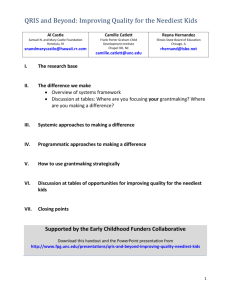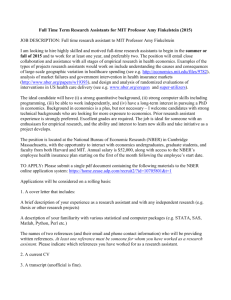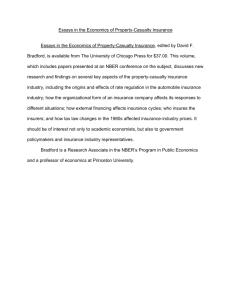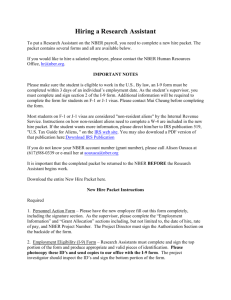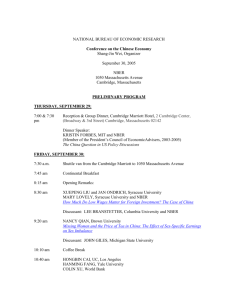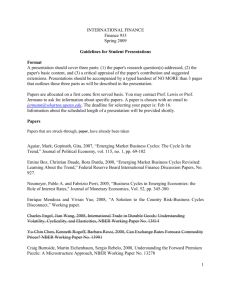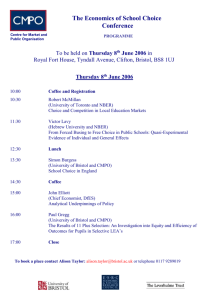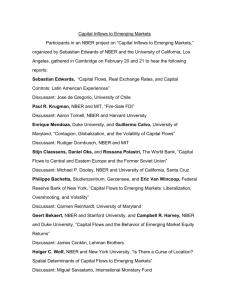international trade policy: readings
advertisement
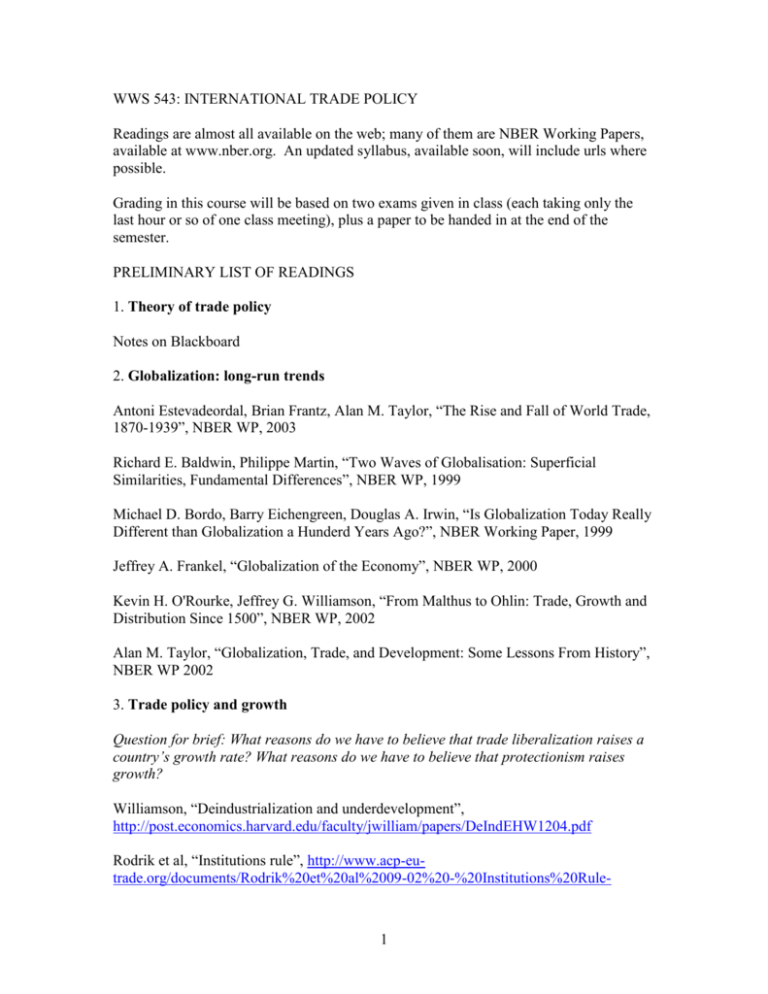
WWS 543: INTERNATIONAL TRADE POLICY Readings are almost all available on the web; many of them are NBER Working Papers, available at www.nber.org. An updated syllabus, available soon, will include urls where possible. Grading in this course will be based on two exams given in class (each taking only the last hour or so of one class meeting), plus a paper to be handed in at the end of the semester. PRELIMINARY LIST OF READINGS 1. Theory of trade policy Notes on Blackboard 2. Globalization: long-run trends Antoni Estevadeordal, Brian Frantz, Alan M. Taylor, “The Rise and Fall of World Trade, 1870-1939”, NBER WP, 2003 Richard E. Baldwin, Philippe Martin, “Two Waves of Globalisation: Superficial Similarities, Fundamental Differences”, NBER WP, 1999 Michael D. Bordo, Barry Eichengreen, Douglas A. Irwin, “Is Globalization Today Really Different than Globalization a Hunderd Years Ago?”, NBER Working Paper, 1999 Jeffrey A. Frankel, “Globalization of the Economy”, NBER WP, 2000 Kevin H. O'Rourke, Jeffrey G. Williamson, “From Malthus to Ohlin: Trade, Growth and Distribution Since 1500”, NBER WP, 2002 Alan M. Taylor, “Globalization, Trade, and Development: Some Lessons From History”, NBER WP 2002 3. Trade policy and growth Question for brief: What reasons do we have to believe that trade liberalization raises a country’s growth rate? What reasons do we have to believe that protectionism raises growth? Williamson, “Deindustrialization and underdevelopment”, http://post.economics.harvard.edu/faculty/jwilliam/papers/DeIndEHW1204.pdf Rodrik et al, “Institutions rule”, http://www.acp-eutrade.org/documents/Rodrik%20et%20al%2009-02%20-%20Institutions%20Rule- 1 The%20Primacy%20of%20Institutions%20Over%20Geography%20and%20Integration %20in%20Economic%20Development.pdf M. A. Clemens and J. G. Williamson (2001), “A Tariff-Growth Paradox? Protection’s Impact the World Around 1875-1997,” NBER Working Paper 8459, National Bureau of Economic Research, Cambridge, Mass. (September). Dollar, D. and A. Kraay (2003), “Institutions, trade, and growth: Revisiting the evidence,” World Bank Policy Research Paper #3004. http://econ.worldbank.org/files/24986_wps3004.pdf Juan Carlos Hallak, James Levinsohn, “Fooling Ourselves: Evaluating the Globalization and Growth Debate” NBER WP, 2004 Irwin, Douglas A. (2002), “Did Import Substitution Promote Growth in the Late Nineteenth Century,” NBER Working Paper No. 8751 (February). Rodriguez, Francisco and Dani Rodrik (2001), “Trade Policy and Economic Growth: A Skeptic’s Guide to the Cross-National Evidence,” in Ben Bernanke and Kenneth S. Rogoff, eds., NBER Macroeconomics Annual 2000, , Cambridge, MA: MIT Press for NBER. http://papers.nber.org/papers/w7081.pdf 4. Trade and inequality Question for this week: Is trade responsible for growing inequality in advanced countries? What about developing countries? Starred readings have priority Aghion, P., R. Burgess, S. Redding, and F. Zilibotti (2003): “The Unequal Effects of Liberalization: Theory and Evidence from India,” LSE mimeo. London, UK: LSE. http://econ.lse.ac.uk/staff/rburgess/wp/abrz031002.pdf Behrman, J., Birdsall N. and M. Szekely (2000): "Economic Reform and Wage Differentials in Latin America," IADB Working Paper 435. Washington, DC: InterAmerican Development Bank. *Borjas, George, Richard B. Freeman and Lawrence F. Katz. 1997. “How Much Do Immigration and Trade Affect Labor Market Outcomes,” Brookings Papers on Economic Activity Vol 1, pp: 1-90. http://ksghome.harvard.edu/~GBorjas/Papers/Immigration_and_Trade.pdf 2 *Brown, Drusilla, Alan V. Deardorff and Robert M. Stern. 2003. “The Effects of Multinational Production on Wages and Working Conditions in Developing Countries NBER WP 9669, April. Edmonds, E. and N. Pavcnik (2004a): “International Trade and Child Labor: Crosscountry evidence,” NBER Working Paper 10317. Feenstra, R. and G. Hanson (2003): “Global Production Sharing and Rising Inequality: A Survey of Trade and Wages,” in Choi E.K. and J. Harrigan (eds.) Handbook of International Trade. Blackwell: Malden, MA, 146-185. *Goldberg and Pavncik, “Trade, Inequality, and Poverty: What Do We Know? Evidence from Recent Trade Liberalization Episodes in Developing Countries”, NBER WP Harrison, A. and J. Scorse (2004b): “Moving Up or Moving Out? Anti-Sweatshop Activists and Labor Market Outcomes,” NBER Working Paper 10492. Krugman, Paul, 1995, “Growing World Trade: Causes and Consequences,” Brookings Papers on Economic Activity, Vol. (1), pp. 327–62. Robertson, R. (2000): “Trade Liberalization and Wage Inequality: Lessons from the MexicanExperience,” World Economy 23, 827-849. *Winters, A., N. McCulloch, and A. McKay (2004): “Trade Liberalization and Poverty: The Evidence so Far,” Journal of Economic Literature 62, 72-115. http://www.nottingham.ac.uk/economics/credit/research/papers/CP.02.22.pdf *Wood, A. (1995): “How Trade Hurt Unskilled Workers”, Journal of Economic Perspectives, 9(3), pp. 57-80. (Available on JSTOR) 5. The outsourcing controversy Amiti and Wei, “Fear of Service Outsourcing: Is It Justified?”, NBER WP, 2004 Amiti, Mary and Shang-Jin Wei, 2004, “Service Outsourcing, Productivity and Employment,” IMF Working Paper, forthcoming. Brainard, Lael and Robert Litan, 2004, "Offshoring Service Jobs: Bane or Boon and What toDo?” The Brookings Institution Policy Brief No. 132. Council of Economic Advisors, 2004, Economic Report of the President. 3 Mann, Catherine L., 2004, “Globalization of IT Services and White Collar Jobs: The Next Wave of Productivity Growth,” International Economics Policy Briefs 3–11. Institute of International Economics. McKinsey Global Institute, 2003, “Offshoring: Is it a Win-Win Game?” www.mckinsey.com/knowledge/mgi/offshore. Schultz, Charles, 2004, “Offshoring, Import Competition and Jobless Recovery,” Brookings Brief. 6. Trade and the environment Antweiler, A., B. Copeland and M. S. Taylor (2001), "Is Free Trade Good for the Environment," American Economic Review 94, 1, September: 877-908. Brock and Taylor, “Trade, Tragedy, and the Commons”, NBER WP, 2004 _______, “Economic Growth and the Environment: A Review of Theory and Empirics” Deaton, “Health in an Age of Globalization” Levinson and Taylor, “Unmasking the Pollution Haven Effect” Stern, David, I. (2003), .The rise and fall of the environmental kuznets curve,. Department of Economics, Rensselaer Polytechnic Institute, http:www.rpi.edu/dept/economics/. 7. Political economy of trade policy Robert E. Baldwin, Christopher S. Magee, “Is Trade Policy for Sale? Congressional Voting on Recent Trade Bills” J. H. Coatsworth and J. G. Williamson (2002), “The Roots of Latin American Protectionism: Looking Before the Great Depression,” NBER Working Paper 8999, National Bureau of Economic Research, Cambridge, Mass. (June). Douglas A. Irwin, “The Aftermath of Hamilton's "Report on Manufactures"”, NBER WP, 2003 Krugman, Paul R. (1991), “The Move Toward Free Trade Zones,” in Policy Implications of Trade and Currency Zones, A Symposium Sponsored by The Federal Reserve Bank of Kansas City, Jackson Hole, Wyoming, August 22-24. 4 Mayda, Anna Maria and Dani Rodrik. 2001. “Why are Some People (and Countries) More Protectionist than Others?” NBER Working Paper No. 8461. Cambridge, Mass., September. Pushan Dutt, Devashish Mitra, “Political Ideology and Endogenous Trade Policy: An Empirical Investigation”, NBER WP, 2003 D. Rodrik (1995), “Political Economy of Trade Policy.” In G. M. Grossman and K. Rogoff (eds.), Handbook of International Economics, Volume 3 (Amsterdam: Elsevier): 1457-94. O’Rourke, Kevin H. and Richard Sinnott. 2001. “What determines attitudes towards protection? Some cross-country evidence.” In Susan M. Collins and Dani Rodrik (eds.), Brookings Trade Forum 2001. Washington DC: Brookings Institute Press: 157-206. Kevin O'Rourke, “Heckscher-Ohlin Theory and Individual Attitudes Towards Globalization”, NBER WP, 2003 Scheve, Kenneth F. and Matthew J. Slaughter. 2001. “What Determines Individual Trade-Policy Preferences?” Journal of International Economics 54: 267-292. J. G. Williamson (1998), “Globalization, Labor Markets and Policy Backlash in the Past,” Journal of Economic Perspectives 12 (Fall): 51-72. 8. The WTO: Does it matter? Arvind Subramanian, Shang-Jin Wei, “The WTO Promotes Trade, Strongly But Unevenly”, NBER WP, 2003 Bhagwati, Jagdish. 1995. “Trade Liberalisation and ‘Fair Trade’ Demands: Addressing the Environmental and Labour Standards Issues.” The World Economy, vol. 18: 745-59. Dani Rodrik, “Feasible globalizations,” NBER WP 9129 Richard B. Freeman, “Trade wars: The exaggerated role of trade in economic debate,” NBER WP 10000 Irwin, Douglas A. (1995) “The GATT in Historical Perspective” American Economic Review 85-2, 323-328. 5 Rose, A.K., 2002a, “Do We Really Know that the WTO Increases Trade?” NBER Working Paper No. 9273 (Cambridge, MA: NBER). ______, A.K., 2002b, “Do WTO Members have More Liberal Trade Policy?” NBER Working Paper No. 9347 (Cambridge, MA: NBER). 9. Mulilateralism, bilateralism, and all that Andriamananjara, S. (1999), “Regionalism and Incentives for Multilateralism,” Office of Economics Working Paper, USITC, No. 99-09-A, September. Andriamananjara, S. (2000), “Regionalism versus Multilateralism: The Response of the Third Country,” Office of Economics Working Paper, USITC, No. 2000-02-C, February. Frankel, J., 1997, Regional Trading Blocs in the World Economic System, , (Washington: Institute for International Economics). Freund, C. L. (2000), “Spaghetti Regionalism,” Board of Governors of the Federal Reserve System, International Finance Discussion Papers, Number 680, September. Alejandro Ibarra-Yunez, “Spaghetti Regionalism or Strategic Foreign Trade: Some Evidence for Mexico”, NBER WP, 2003 World Bank (2000), “Trade Blocs,” Policy Research Report, Washington, D.C. 10. Complaints, disputes, and settlements Dukgeun Ahn, “WTO Dispute Settlements in East Asia”, NBER WP, 2003 Blonigen, Bruce. “Evolving Discretionary Practices of U.S. Antidumping Activity.” NBER Working Paper No. 9625, April 2003. Bown, Chad P. “Why Are Safeguard Measures under the WTO So Unpopular?” World Trade Review 1 (March 2002): 47-62 Eduardo Engel, “Poisoned Grapes, Mad Cow, and Protectionism”, NBER WP 6959 Douglas Irwin, “The Rise of U.S. Antidumping Actions in Historical Perspective”, NBER WP, 2004 Douglas A. Irwin, “Causing Problems? The WTO Review of Causation and Injury Attribution in U.S. Section 201 Cases” U.S. International Trade Commission. Steel. Publication No. 3479. Washington, D.C.: USITC, December 2001. (B) 6 11. China and its sphere Ahearne, Alan G., John G. Fernald, Prakash Loungani and John W. Schindler (2003), “China and Emerging Asia: Comrades or Competitors?” International Finance Discussion Paper no. 789, Board of Governors, Federal Reserve System (December). Ando and Kimura, “The Formation of International Production and Distribution Networks in East Asia” Agata Antkiewicz, John Whalley, “China’s new regional trade agreements,” NBER WP 10992 Robert C. Feenstra, Gordon H. Hanson, “Ownership and Control in Outsourcing to China: Estimating the Property-Rights Theory of the Firm” James Harrigan, Rohit Vanjani, “Is Japan's Trade (still) Different?”, NBER WP, 2003 International Monetary Fund (2004), “China’s Emergence and its Impact on the Global Economy,” World Economic Outlook (April). Mallon G., Whalley J., 2004. China's Post Accession WTO Stance. Working Paper 10649. Cambridge MA: National Bureau of Economic Research. 12. Textiles and apparel Evans and Harrigan, “Tight clothing: how the MFA affects Asian apparel exports,” NBER WP, 2004 Evans, Carolyn L., and James Harrigan. “Distance, Time, and Specialization.” NBER Working Paper no. 9729, May 2003. Krishna, Kala M., and Ling Hui Tan. Rags and Riches: Implementing Apparel Quotas under the Multi-Fibre Arrangement. Ann Arbor: University of Michigan Press, 1998. United States International Trade Commission (USITC) The Economic Effects of Significant U.S. Import Restraints. Third Update 2002, June 2002. 7
